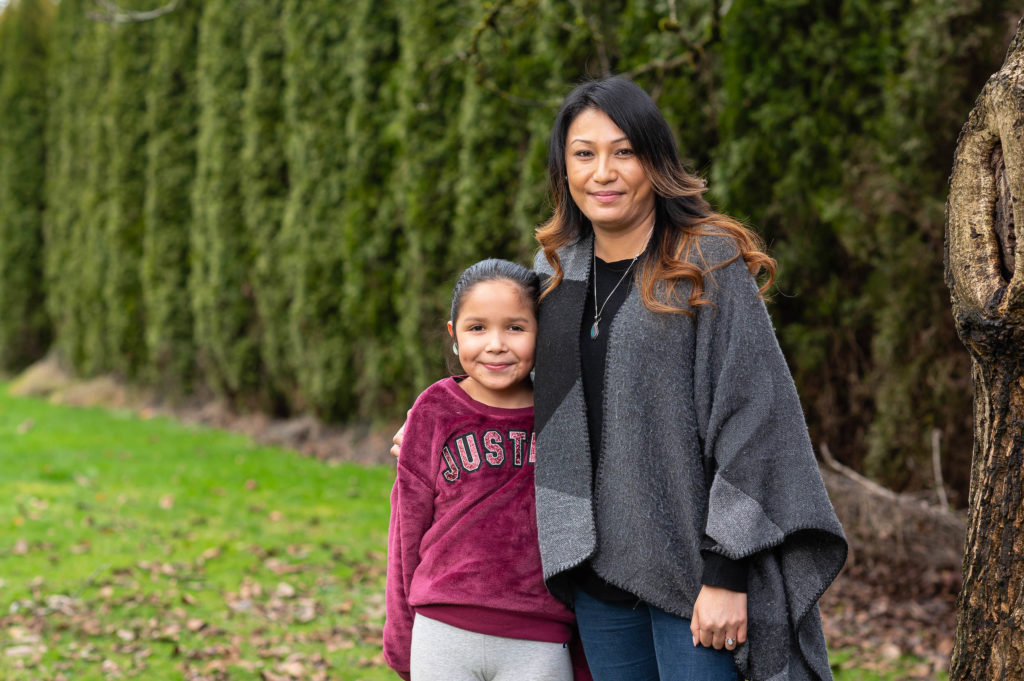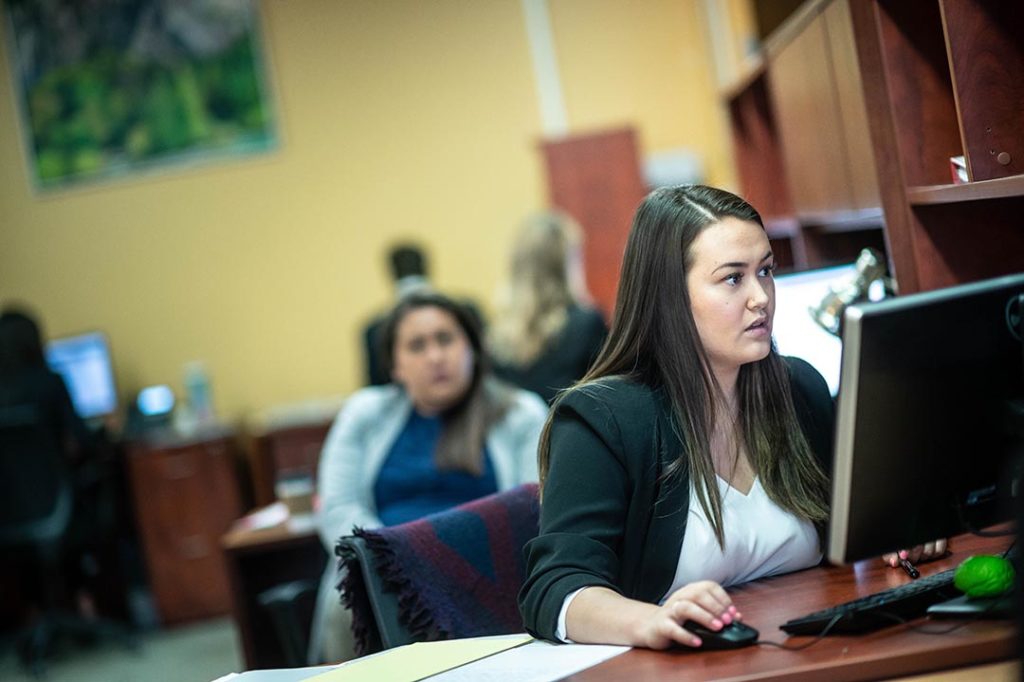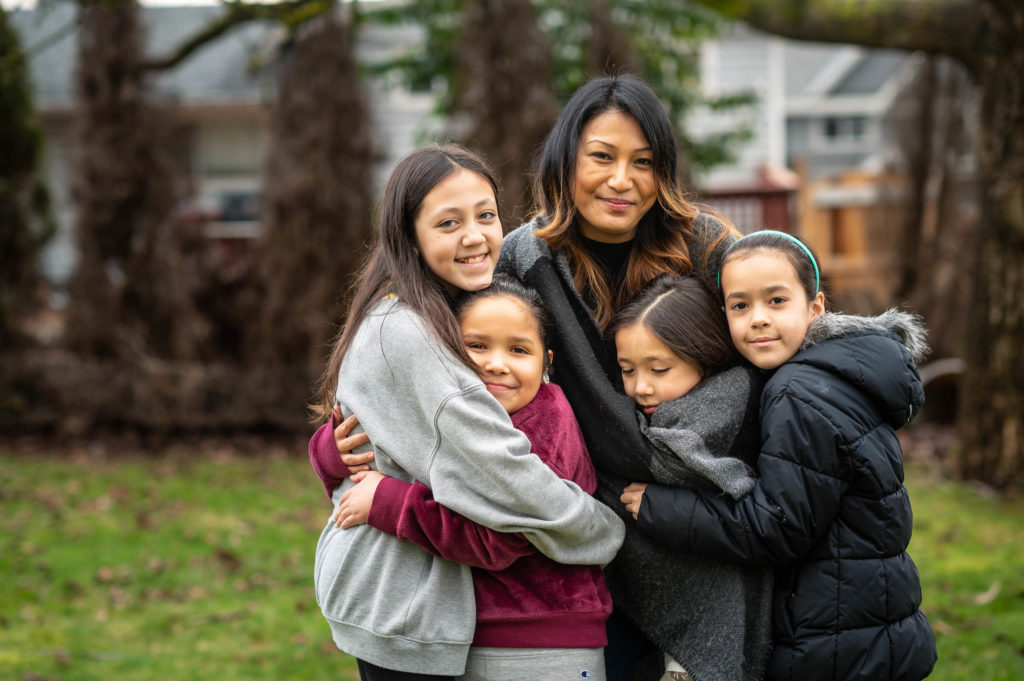Indigenous Community Legal Clinic creates change, one file and one student at a time
Mai Eagle Speaker just wanted to care for her niece, Mya.
Eagle Speaker’s sister— little Mya’s mother—was not well, gripped by addiction and the street life of Vancouver’s Downtown Eastside. Eagle Speaker thought her niece should come and live with her in Coquitlam.
But Mya was in state care, living in a foster home. To bring her back to the family, Eagle Speaker would first need the state to agree.
The state had put Eagle Speaker’s mother in a residential school. The state had put Eagle Speaker and her seven siblings in foster homes. The state had effectively put her sister on the street.
What reason did Eagle Speaker have to believe the state would be on her side?
So she went to the Indigenous Community Legal Clinic, which is run by the Peter A. Allard School of Law out of a storefront in Vancouver’s Downtown Eastside. For 25 years, the UBC clinic has been there for Indigenous people who need somebody on their side.
“Any legal matter that involves an Indigenous person is at its heart different,” says Patricia Barkaskas, the clinic’s director who, along with articled student Michele Harden, represented Eagle Speaker at the hearing where she gained guardianship of her niece. “Indigenous people have been in an oppressive relationship with the state since Canada’s inception, and frankly, even before. Engagement with the state at any level means their perspective is almost always one where they’re coming to the relationship with fear and intimidation.”
The clinic has helped Indigenous people navigate that relationship since 1994. It offers free legal services for Indigenous people who couldn’t otherwise afford it, while giving UBC law students the opportunity to do real legal work outside the classroom. To mark its 25th anniversary, the clinic expanded into office space next door and began taking on three additional students per term.
Eagle Speaker’s case provides a good example of how the clinic works. As a working widowed mother who was already raising four children, Eagle Speaker couldn’t afford to pay for a lawyer. Barkaskas and supervising lawyer Salima Samnani oversaw her file. A number of students worked on it over several years, as Eagle Speaker first sought to remove her niece from state care, then vied with extended family for guardianship.

Mai Eagle Speaker and Mya, 9. Credit: Paul Joseph/UBC
More than one-third of the clinic’s files fall into this area of family law where children’s relations step up to provide care. However, clients bring a wide range of other problems to the door. These could be simple landlord-tenant disputes, easily resolved with a strongly worded letter. Or they could be serious criminal charges, to be answered in provincial court. Students do the work and run the files under the supervision of lawyers. Through this arrangement, clients get help and students gain experience.
But Barkaskas believes something else happens as well. With every UBC law student who walks out of the Indigenous Community Legal Clinic and into the legal profession, the legal system becomes a little less hostile to Indigenous people.
The Truth and Reconciliation Commission of Canada’s 2015 report identified systemic racism in Canada’s justice system, and the numbers don’t lie. Indigenous people comprise 30 per cent of inmates in federal custody, but only five per cent of the total population in Canada. The commission’s calls to action included several aimed at addressing inequities in the justice system, from training lawyers in cultural competency to educating all law students about Indigenous people and their history.
The commission also called out the child welfare system. As of 2018, more than 52 per cent of children under 15 in foster homes were Indigenous, while only 7.7 per cent of this age group Canada-wide was Indigenous.
Early in her efforts to bring Mya home, Eagle Speaker met resistance from social workers who noted that she had four kids already. They wondered whether she could handle another.
It’s a fair question to ask, but would it have been asked of a non-Indigenous person?
This, too, is a fair question to ask.
The first thing students learn when they join the Indigenous Community Legal Clinic is to meet clients with empathy and without judgment. Legal services director Mark Gervin makes the point during student orientation: when a client sits down across from them, it may be the first time a person in a suit has treated that client with respect and dignity.
“As much as students are learning when they come here, they’re also unlearning,” says Barkaskas. “They’re unlearning the notion that anyone who comes to work with a lawyer is coming from a position of power or privilege. The law is very much a domain of privilege, so having our students pause and think about the ways in which the clients sitting across from them are not coming from a place of privilege and power—in fact, they are the people in this country who have suffered the most from that privilege and power—is an important first step in the unlearning process.”

UBC law students at work in the Indigenous Community Legal Clinic in February, before the COVID-19 crisis. Credit: Paul Joseph/UBC
Michele Harden knew these things going in. She just completed her articling year at the clinic after coming to Allard in 2015 as a mature student from Muskeg Lake Cree Nation in Saskatchewan. Before law school, she had spent years working with youth in the criminal justice system, and at a drug and alcohol treatment centre in the Fraser Valley. With her experience, she was able to lead a workshop about trauma-informed lawyering during student orientation in January.
In that session, Harden asked students to close their eyes and imagine a moment in their life when they felt the most trauma, the most pain, the most shame. The room went quiet. She asked them to remember how that moment made them feel.
Then, as the students were immersed in their most painful private thoughts, she asked if anyone would like to share with the group.
There were no volunteers. That was the point.
“We ask our clients to do that all the time,” explains Barkaskas, adding that lawyers often do it five minutes after first meeting a client. She wants students to understand the apprehension that clients bring to these encounters. “That education isn’t just for our students. It’s also about the way they go into the world, and their interactions and relationships with opposing counsel, Crown counsel, and even judges. They are doing law differently, and educating the courts and the profession about how and why that’s necessary.”
Soon, Harden will be called to the bar and begin working as a lawyer. The firm she is joining represents the B.C. government in child protection cases. She will be working for the state.
“I have always worked for people trying to manage and navigate these systems,” Harden says. “But I think working on the other side, I might be able to bring a different lens to the work that they do.”
The hummingbird is the Indigenous Community Legal Clinic’s symbol, adorning its windows, walls and a painting in the director’s office. As the only creature that understands all languages—according to a Kwakwak’wwakw legend gifted to the clinic by its first director, Renee Taylor—the hummingbird is a translator who helps people understand each other. This is the spirit that Harden will take into her new job.
Change happens in small steps. Nine-year-old Mya is now living in Coquitlam with Eagle Speaker and her children. They have a big yard, with parks and schools close by. Mya goes to acting class on Thursday nights and shares a bedroom with her 11-year-old cousin Cali. She has become more like a sibling to her cousins. Mya still has difficult things to deal with, but she’s surrounded by family. And her aunt Mai—her guardian—has been through it all and come out the other side.
“I don’t want this cycle repeated,” says Eagle Speaker. “I want to break this cycle.”

Mai Eagle Speaker and Cali, 11; Mya, 9; Gia, 7; and Alexis, 9. Credit: Paul Joseph/UBC
What Eagle Speaker is doing for her niece recalls another story that Barkaskas tells about a hummingbird, which she credits to the Quechuan people of Peru. It deals with a huge forest fire that has driven all the woodland creatures out to a beach. As the animals panic and Bear tries to bring order to the chaos, they notice Hummingbird flying back and forth overhead between the beach and the blaze. Hummingbird seems to be carrying water and depositing it on the inferno, one drop at a time. Bear asks what she is doing.
“I’m doing all I can,” says Hummingbird.
For Indigenous people in Canada, the state and its legal system are the inferno. When Barkaskas is asked about her clinic’s 25th anniversary, its expansion, and what it will enable going forward, she doesn’t hesitate.
“It will allow us to create more hummingbirds,” she says.
At the clinic, they are doing what they can. And in Coquitlam, Mai Eagle Speaker is doing what she can.
The Indigenous Community Legal Clinic is an experiential learning program at the Allard School of Law that exists thanks to the generous support of its many donors, including the Law Foundation of British Columbia, and community supporters.

